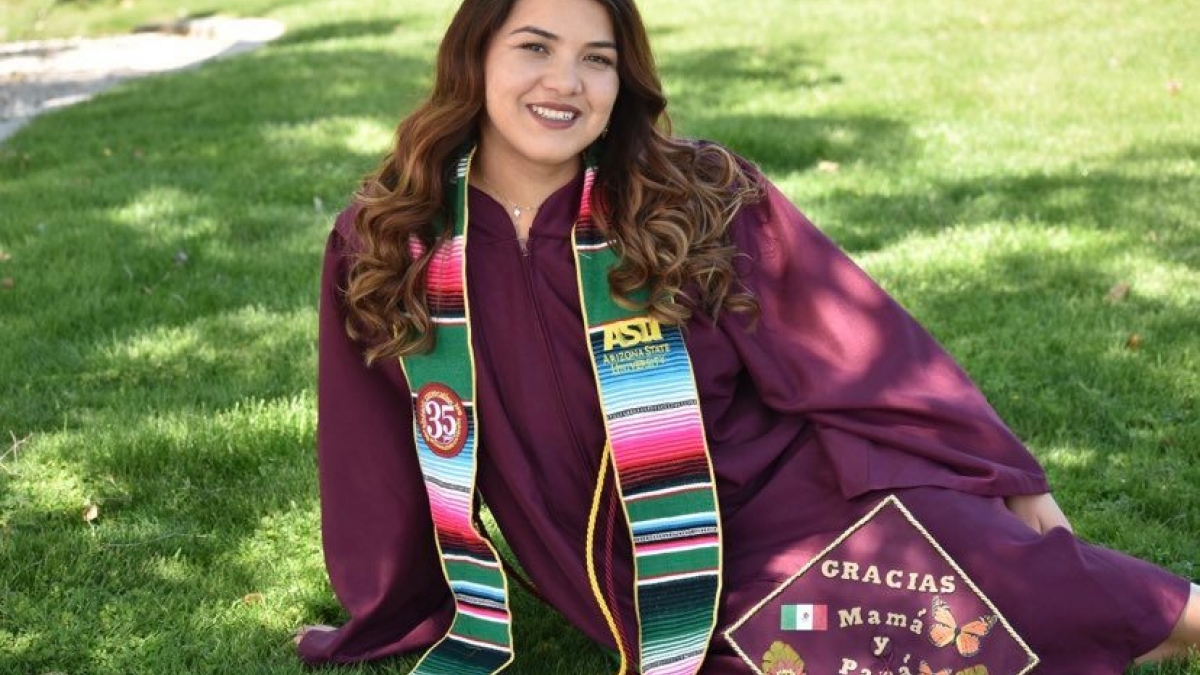Editor's note: This story is part of a series of profiles of notable spring 2020 graduates.
Maricela Diaz, a sociology major from the T. Denny Sanford School of Social and Family Dynamics at Arizona State University, talks about changing majors, the benefits of studying abroad and her goal to work in the foster care system.
Question: What was your “aha” moment, when you realized you wanted to study the field you majored in?
Answer: My “aha” moment happened a little late, but oddly early enough for me to have time to switch majors. It was move-in week during my freshman year and I went to my suitemates’ room to get to know them better. One of them said she was a sociology major and explained everything she could do with that degree. As she was speaking, I could picture myself in all the careers she was mentioning. At that point, I was a French major because I was obsessed with the idea of becoming an FBI language analyst. The first day of class was a Thursday and it was also the day I switched my major to sociology. I went to my French class and by the end, I knew that I couldn’t do that for four years.
Q: What’s something you learned while at ASU — in the classroom or otherwise — that surprised you or changed your perspective?
A: From my research method class, I learned that it is good to question things and be curious. There is always something new to learn or an issue that needs clarity.
Q: Why did you choose ASU?
A: The main reason I choose ASU was because it fully funded my education. Also, it gave me the best of both worlds. I was able to live on campus and learn to be independent while staying close to my family.
Q: Which professor taught you the most important lesson while at ASU?
A: During my time at ASU, I’ve had the opportunity to build relationships with amazing professors. I’ve certainly learned something from each and every one of them, but a lesson that stands out was taught to me by Dr. Cassandra Cotton. I had the opportunity to work with her for a few weeks, and during that time she taught me to embrace my interests and plans for the future. This past year I’ve questioned what I wanted to do after graduation multiple times. Dr. Cotton has always been supportive of my choices and encourages me to do what is best for me.
Q: What’s the best piece of advice you’d give to those still in school?
A: To those still in school, my best advice is to study abroad if possible. There is so much a person can learn from leaving and studying in another country. Studying abroad is a once-in-a-lifetime opportunity that allows students to not only see the world but also experience different cultures by interacting with different people.
Q: What was your favorite spot on campus, whether for studying, meeting friends or just thinking about life?
A: My favorite place to relax and study on campus is the third floor of the student services building in Tempe. There is a balcony that overlooks the student services lawn. This is probably the only place that is not full during midterms or finals week because not many students know about it.
Q: What are your plans after graduation?
A: After graduation, I want to work for an organization that helps foster care children. I hope to get a position where I can help with the adoption process of these children while making sure that they are going to a good home.
Q: If someone gave you $40 million to solve one problem on our planet, what would you tackle?
A: In the last two years, I had the opportunity to travel to Morocco, Spain, and Brazil and a common problem I saw are favelas or slums. The people that live in these areas lack basic sanitation, clean water and electricity. If someone gave me $40 million, I would invest the money in upgrading the infrastructure of these communities to improve living conditions and to provide access to services and education for residents.
More Arts, humanities and education

ASU professor's project helps students learn complex topics
One of Arizona State University’s top professors is using her signature research project to improve how college students learn…

Award-winning playwright shares her scriptwriting process with ASU students
Actions speak louder than words. That’s why award-winning playwright Y York is workshopping her latest play, "Becoming…

Exceeding great expectations in downtown Mesa
Anyone visiting downtown Mesa over the past couple of years has a lot to rave about: The bevy of restaurants, unique local shops…


